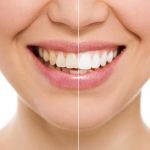If you've ever experienced your gums bleeding heavily, you know how concerning it can be. It's not just a minor issue; it can indicate something more serious. I remember the first time my gums started bleeding, and I was worried it was something far worse than just a random occurrence. After a few visits to the dentist, I discovered that bleeding gums are often caused by something as simple as improper brushing or poor oral hygiene. However, it can also be a sign of more serious conditions like gum disease or even systemic health issues.
1. Why Are My Gums Bleeding?
The first question you might be asking yourself is, "Why are my gums bleeding?" The answer is that there are multiple reasons this could be happening. Some of the most common causes of gum bleeding include:
- Poor Oral Hygiene: If you aren't brushing or flossing your teeth regularly, plaque builds up along your gum line. This plaque can cause gum irritation and lead to bleeding when you brush or floss.
- Gum Disease (Gingivitis or Periodontitis): Gum disease is one of the leading causes of bleeding gums. Gingivitis, the early stage of gum disease, causes the gums to become inflamed and bleed easily. If left untreated, it can progress to periodontitis, which can lead to tooth loss.
- Medication Side Effects: Certain medications, like blood thinners, can make your gums more susceptible to bleeding.
- Vitamin Deficiencies: A lack of essential vitamins, particularly vitamin C (scurvy) and vitamin K, can lead to gum problems, including bleeding.
- Hormonal Changes: Changes in hormones, such as those experienced during pregnancy, menstruation, or menopause, can also cause gum sensitivity and bleeding.
- Underlying Health Conditions: Conditions like diabetes, blood disorders, and even some forms of cancer can cause bleeding gums as a symptom.
Understanding the cause of your gum bleeding is essential for determining the appropriate course of action. If your gums are bleeding heavily and frequently, it’s time to take steps to address it before it turns into a bigger issue.
2. What Should I Do If My Gums Are Bleeding Heavily?
If you notice that your gums are bleeding heavily, it’s important not to panic. There are several immediate actions you can take to reduce bleeding and start the healing process:
2.1. Gently Brush and Floss
It might seem counterintuitive to brush and floss if your gums are bleeding, but gentle cleaning is crucial. Use a soft-bristled toothbrush and make sure to brush your teeth twice a day. Avoid aggressive brushing or using hard bristles, as this can exacerbate the bleeding. Floss gently around your gums to remove plaque, but be cautious not to cause further irritation.
2.2. Rinse With Salt Water
One of the simplest and most effective ways to treat bleeding gums is by rinsing your mouth with salt water. Mix one teaspoon of salt with a cup of warm water, and rinse your mouth for 30 seconds. Salt has natural antibacterial properties and can help soothe irritated gums while reducing inflammation.
2.3. Apply a Cold Compress
If your gums are swollen and bleeding heavily, applying a cold compress to the outside of your mouth can help reduce swelling and ease discomfort. A cold compress constricts the blood vessels and can help control bleeding. Simply wrap some ice in a clean cloth and apply it to the affected area for 10-15 minutes at a time.
2.4. Avoid Irritating Foods and Drinks
While your gums are healing, it's important to avoid foods and drinks that can irritate your gums further. Stay away from acidic, spicy, or crunchy foods that could worsen inflammation or cause additional bleeding. Stick to soft, bland foods until the bleeding subsides.
3. When Should I See a Dentist?
If the bleeding continues or worsens, it’s time to see a dentist. I’ve learned the hard way that ignoring gum issues can lead to bigger problems. Here’s when you should consider visiting your dentist:
- If the bleeding persists for more than a few days.
- If you notice other symptoms such as persistent bad breath, receding gums, or loose teeth.
- If your gums bleed even when you’re not brushing or flossing.
- If the bleeding is accompanied by pain or swelling that doesn’t go away with basic treatments.
Your dentist can help determine the cause of the bleeding and offer appropriate treatments. Depending on the severity, treatments may range from a professional cleaning to more advanced procedures if you have gum disease.
4. Prevention: How Can I Keep My Gums Healthy?
Once you’ve addressed your bleeding gums, it’s time to take steps to prevent it from happening again. Good oral hygiene habits are the cornerstone of maintaining healthy gums. Here are a few tips to keep your gums in tip-top shape:
4.1. Brush Twice a Day
Brushing your teeth twice a day, especially after meals, helps prevent plaque buildup and keeps your gums healthy. Make sure to use fluoride toothpaste and a soft-bristled toothbrush to avoid damaging your gums.
4.2. Floss Daily
Flossing removes plaque and food particles from between your teeth, where your toothbrush might not reach. Regular flossing is essential to prevent gum disease and keep your gums from bleeding.
4.3. Visit Your Dentist Regularly
Regular dental check-ups are crucial for catching gum problems early before they become serious. I make it a point to visit my dentist every six months for a professional cleaning and check-up.
4.4. Eat a Balanced Diet
Eating a diet rich in vitamins and minerals supports overall oral health. Foods high in vitamin C, such as oranges and strawberries, help keep your gums strong and prevent bleeding. Make sure you’re also getting enough vitamin K, which plays a role in blood clotting and gum health.
5. My Personal Story: How I Dealt with Bleeding Gums
Let me share a little personal story. A few months ago, I noticed that my gums would bleed whenever I brushed my teeth. At first, I brushed it off as no big deal, but after a few days, it didn’t stop. I was getting worried. I decided to visit my dentist, who explained that I had early-stage gingivitis due to not flossing enough. After a professional cleaning and some lifestyle changes, my bleeding stopped, and my gums returned to normal. I now take better care of my oral health and haven’t had a problem since!







 ADVANCED SMILES PC4.0 (205 review)
ADVANCED SMILES PC4.0 (205 review) Leonard I Nunnally III DDS4.0 (107 review)
Leonard I Nunnally III DDS4.0 (107 review) Kristen Ramirez0.0 (0 review)
Kristen Ramirez0.0 (0 review) Star Smiles Orthodontics4.0 (24 review)
Star Smiles Orthodontics4.0 (24 review) The Smile Express4.0 (420 review)
The Smile Express4.0 (420 review) West Loop Dental Associates4.0 (24 review)
West Loop Dental Associates4.0 (24 review) The Importance of Oral Health Education During Pregnancy for a Healthy Pregnancy
The Importance of Oral Health Education During Pregnancy for a Healthy Pregnancy Best Tips for Brushing Your Teeth Properly for Healthy Gums: Essential Techniques for Oral Health
Best Tips for Brushing Your Teeth Properly for Healthy Gums: Essential Techniques for Oral Health Why Skipping Dental Checkups Can Lead to Bigger Oral Health Problems
Why Skipping Dental Checkups Can Lead to Bigger Oral Health Problems Advantages of Porcelain Dental Restorations
Advantages of Porcelain Dental Restorations How Can Diabetes Cause Tooth and Gum Problems? Preventing and Managing Oral Health Issues
How Can Diabetes Cause Tooth and Gum Problems? Preventing and Managing Oral Health Issues Healthy Habits for Promoting Good Oral Health and Hygiene: Tips for a Healthy Smile
Healthy Habits for Promoting Good Oral Health and Hygiene: Tips for a Healthy Smile